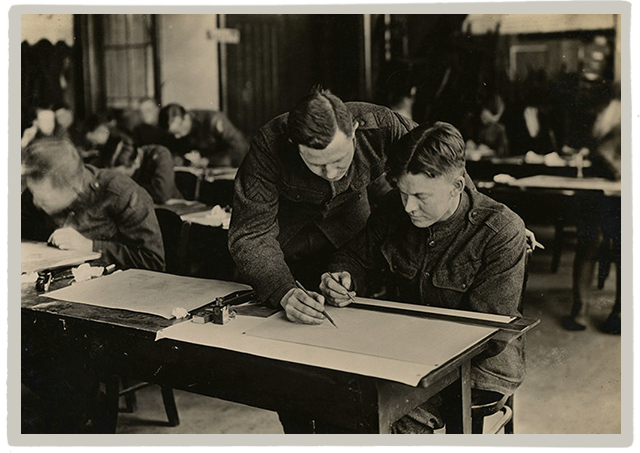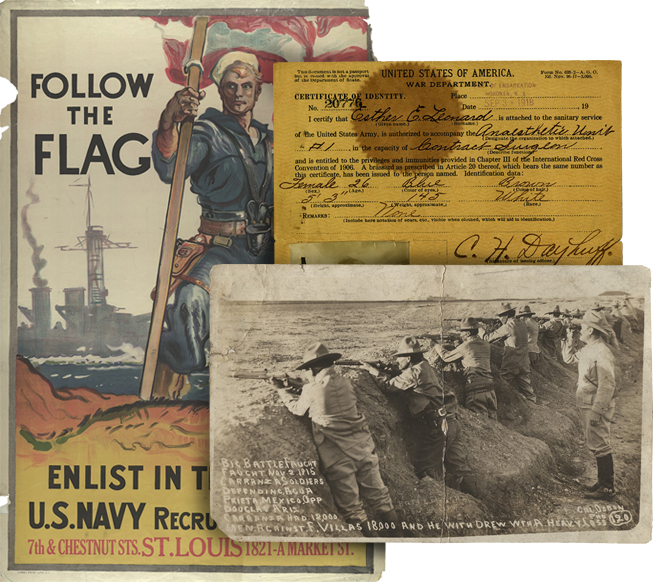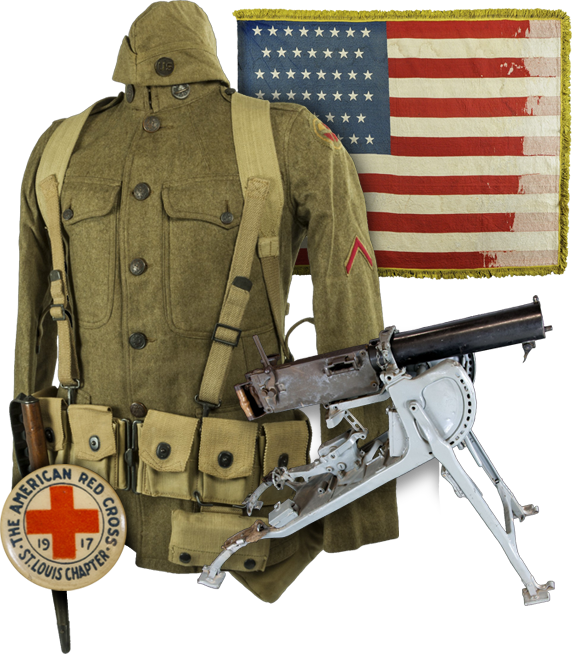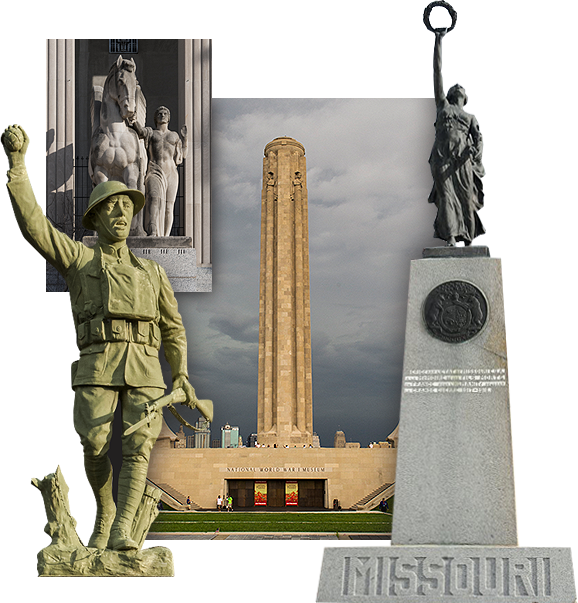Fritz Von Versen letter to Mary Clemens - January 20, 1915

Transcript
2. Rowallerie – Division Garderegiment Escadron Versen [January 20, 1915]. Dear Cousin! I thank you very much for our kind letters of October 7th and 31st. A cavalryman has not very much time to write and if it is cold, this is not possible in the field. We are always day and night next to the enemy to see where he is and to tell if he is coming. When we arrived [ms illegible: 1wd] Reims the French and English troops built big trenches and did no more to attack or very seldom till some weeks ago. It is very pitty that now the open war in the West was over. The cavalry now rested behind the front and helped the infanterie in the trenches, which we also built afterwards. So we can let few troops

Transcript
in the front and put the other there where we will attack. For that purpose we employ the [French] railways. At the 1 October I came with my squadron to a, only for the war, composed regiment of cavalry of the guard. This belong to the second division of cavalry. Till now I was at the second army of general von Bulow and I belonged to the guard. Now our cavalry division belonged to the army of the Kronprinz von Bayern. We marched to St. Quentin and than fought near Bapaume, Arras, Douai, Lille, La Bassee, on the Yser-canal, Haithem, America, Hollebeke and south of Spern.

Transcript
It was a hard fighting against French [Arabs], [Turks], [Zouave], [Senegalese] and other wild tribes, English, Indian troops, [English] colony troops, some wild tribes of [English] colonies and Belgians as we were only few. It is incredible that Christian nations brought to Europe such wild tribes. They have very few military values and murder all wounded men. I had with me one man and took prison 23 of such men. The [English] and [French] newspapers tell much stories of their bravery but we did not become aware of it. They may be good for a colonial war and satisfy there very much but the tactic here

Transcript
is nothing for them. The white soldiers always let go them first. The coloured men make much noise and wild gestures. When they are very near we shout, than they have many losses and return very quick with much more noise. The climate too make many ill. I was often in the trenches and attacked trenches. You can’t believe what is there for a noise. The French and English are shooting permanently day and night with cannons of all sizes, machine guns and rifles. The shells explode around you. The bullets pass near your head. From behind pass the own schells over our heads and we hear the noise of the own cannons. Some days were near behind me twenty of our biggest batteries.

Transcript
In the trenches first to the enemy the dead and wounded could only be brought at night to the Lazeretts but our doctors are in the first line. The wounds are mostly dreadfull as the English always and the French mostly shoot with dum-dum. The [French] and [Belgian] people had nothing to eat where we were so we gave them always from our provisions. In the month of November our division of cavallerie was send to Russia and I belong now to the army of field marshal von Hindenburg. In the West we had enough troops as the enemies on every point of the long line were slowly reduced.

Transcript
Here we fight mostly against cavallerie. The Russians have plenty of men but these are very fearful and stupid. The patrols are never less than 30 men. The [Cossacks] are no soldiers, only murders and robbers. They behaved in [Germany] like the soldiers some hundred years ago. Even the Russians fear them. In Germany the treated dreadfully the wifes and girls and killed and burnt all. Therefore they are killed where we can and we gave them never pardon especial as they kill ever prisoner cruelly since the begin of the war. The other Russians are very well treated and

Transcript
therefore always glad if they are prisoner. The [Russian] people do’nt like the war and to fight Our prisoners are treated like [German] soldiers. They work only if they like it. Our enemies say the contrary to prevent their soldiers to desert. The French never put the territorials in the first trenches as they immediately come over when our big cannons fired. No Russian is on [German] earth and we are soon in Warschau. Till now I was not wounded and had good luck as I was often in tremendous fire. I have the “Fisernes Krens”.

Transcript
The French used and use the tower of the Cathedral of [Reims] as look out station. Mase is ill therefore not in the army. Hulda’s husband Georg is at St. Quentin. We have plenty of drilled soldiers but send only in the field what we need. At first the [English] army was very good but in one of the first battles we took prison one third. ( [ms illegible: 1 wd] train with infanterie before these could go out.) The other are now mostly killed or wounded especially the officers. The new troops are not soldiers. This a very hard time to have every hour the enemy before the door and every morning some bullets pass near the head but if on is victorious all is good. Thank you very much for your invitation. I would like very much to come over. With kind regards to Elsie and Tomie cordially your cousin Fritz Versen
Details
| Title | Fritz Von Versen letter to Mary Clemens - January 20, 1915 |
| Creator | Von Verson, Fritz |
| Source | Von Versen, Fritz. Fritz Von Versen letter to Mary Clemens. 20 January 1914. Mary Cornelia Clemens. Clemens Family Collection, 1737-1954. A0298. Missouri History Museum, Saint Louis, Missouri. |
| Description | Fritz Von Verson wrote his cousin, Mary Clemens, of St. Louis, Missouri, several times during World War I. Von Versen was Captain and Eskimchief in the body guard Calvary, Husar Regiment of the German Army. In his letters, Von Versen described the events of World War I from a Germans perspective. He discussed his experiences on the frontlines and was often critical of the Allies and their tactics. Von Versen's letters predated the United States entry into the war. |
| Subject LCSH | World War, 1914-1918--Germany; World War, 1914-1918--Technology; World War, 1914-1918--Equipment and Supplies; World War, 1914-1918--Beligium; World War, 1914-1918--France; World War, 1914-1918--Africa; World War, 1914-1918--India; World War, 1914-1918--T |
| Subject Local | WWI; World War I |
| Site Accession Number | A0298 |
| Contributing Institution | Missouri History Museum |
| Copy Request | Transmission or reproduction of items on these pages beyond those allowed by fair use requires the written permission of the Missouri History Museum: 314-746-4510 |
| Rights | The text and images contained in this collection are intended for research and educational use only. Duplication of any of these images for commercial use without express written consent is expressly prohibited. Contact the Missouri History Museum's Permissions Office at 314-746-4511 to obtain written consent. |
| Date Original | January 20, 1915 |
| Language | English |



